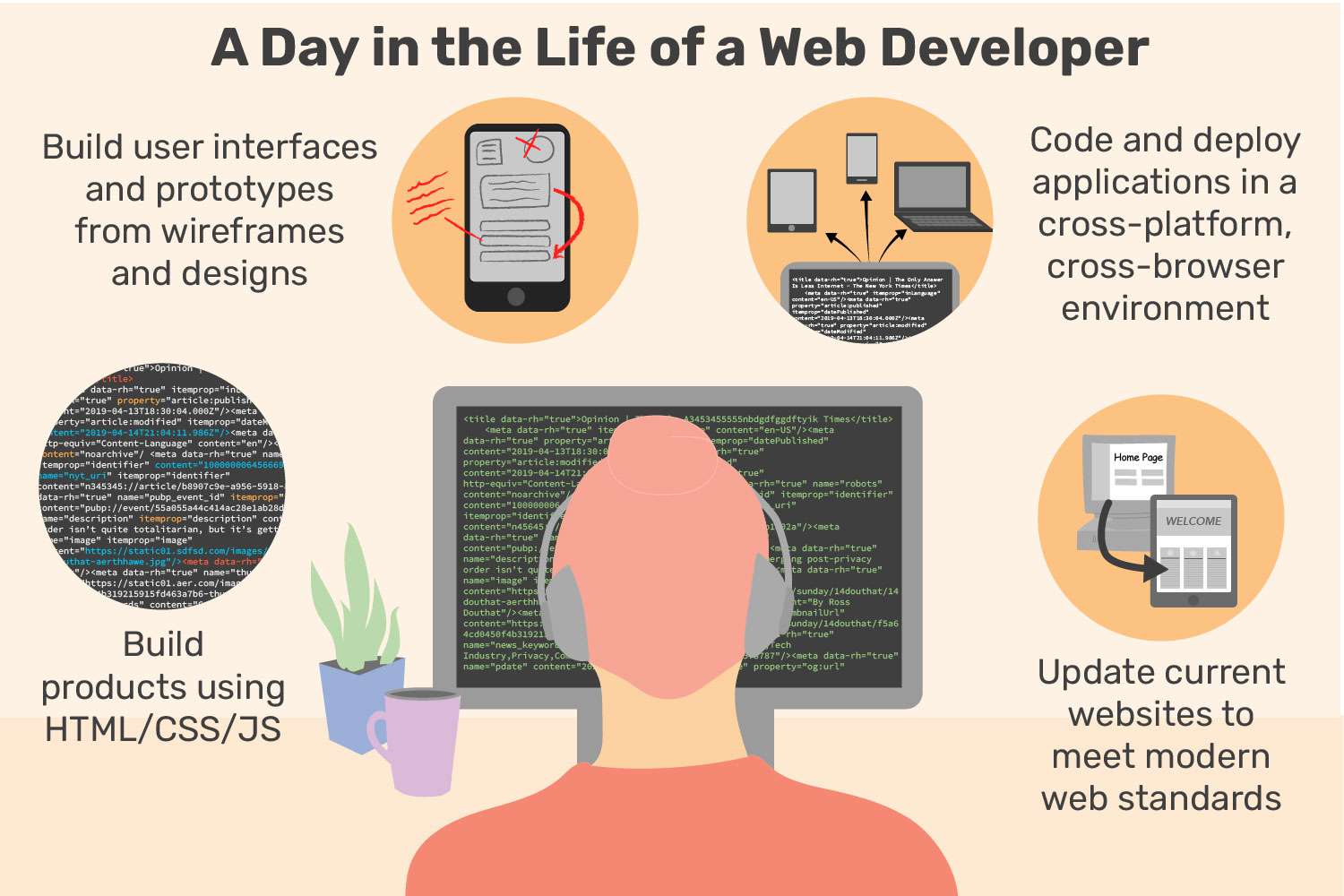
The job prospects in web development remain strong and dynamic as the internet continues to grow and evolve, with businesses, organizations, and individuals relying heavily on web-based platforms and applications. The demand for skilled web developers spans industries and includes roles in frontend, backend, and full-stack development.
1. Growing Demand
- Digital Presence is Essential: Every business needs a website or web app, driving consistent demand for web developers.
- E-commerce Growth: Online retail is booming, requiring developers to create and maintain e-commerce platforms.
- Web Applications: Increasing reliance on web-based software for business operations.
- Mobile-Optimized Experiences: Responsive design for mobile and cross-platform compatibility is critical.
The U.S. Bureau of Labor Statistics (BLS) projects web developer jobs to grow at a rate of 8%–15% from 2022 to 2032, faster than the average for most professions.
2. Key Roles in Web Development
- Frontend Developer: Focused on creating user-facing components using HTML, CSS, and JavaScript.
- Backend Developer: Responsible for server-side logic, databases, and APIs using languages like Python, PHP, Ruby, or Node.js.
- Full-Stack Developer: Combines frontend and backend expertise to build end-to-end solutions.
- Web Designer: Designs the layout, look, and feel of websites.
- UI/UX Developer: Ensures websites are user-friendly and visually appealing.
- Webmaster: Maintains and updates existing websites.
3. Skills in Demand
- Frontend Skills:
- HTML5, CSS3, and JavaScript.
- Frameworks: React.js, Angular, and Vue.js.
- Responsive and mobile-first design techniques.
- Backend Skills:
- Programming languages: Python, PHP, Ruby, Node.js, or Java.
- Frameworks: Express.js, Django, Laravel, and Flask.
- Database Management: SQL (MySQL, PostgreSQL) and NoSQL (MongoDB).
- Other Tools:
- Git for version control.
- RESTful APIs and GraphQL.
- Cloud Platforms: AWS, Azure, and Google Cloud.
- CMS Platforms: WordPress, Joomla, and Drupal.
4. Industries Hiring Web Developers
- E-commerce: Online stores and shopping platforms.
- Technology: SaaS platforms and digital tools.
- Healthcare: Web portals for patient management and telemedicine.
- Education: E-learning platforms and virtual classrooms.
- Finance: Banking websites, trading platforms, and customer portals.
- Media and Entertainment: Streaming sites, news platforms, and interactive content.
5. Emerging Trends in Web Development
- Progressive Web Applications (PWAs): Apps that provide a native-like experience on the web.
- Single Page Applications (SPAs): Websites that load content dynamically, enhancing speed and user experience.
- Web3 Development: Blockchain integration, decentralized applications, and cryptocurrency platforms.
- AI-Powered Web Development: Personalization, chatbots, and predictive analytics using AI.
- Voice Search Optimization: Websites optimized for smart assistants like Alexa and Google Assistant.
- API Economy: Interfacing with third-party APIs to extend website functionality.
6. Certifications and Education
- Popular Certifications:
- Google Mobile Web Specialist.
- Microsoft Certified: Azure Developer Associate.
- FreeCodeCamp Frontend Development Certificate.
- Education:
- Many web developers hold degrees in Computer Science or related fields, but this is not mandatory.
- Bootcamps and online courses offer fast-tracked learning opportunities.
7. Salary Expectations
- Frontend Developers: $60,000–$90,000/year (entry-level).
- Backend Developers: $80,000–$120,000/year.
- Full-Stack Developers: $90,000–$130,000/year.
- Specialized Developers (e.g., Web3 or AI-driven): $120,000–$200,000/year.
8. Benefits of a Web Development Career
- Remote Opportunities: High compatibility with remote or freelance work.
- Creativity: Opportunities to design and innovate.
- High Demand: The need for web developers spans virtually all industries.
- Continuous Learning: Staying updated with emerging technologies and trends keeps the role exciting.
9. Challenges in Web Development
- Rapid Technological Changes: Frequent updates in tools and frameworks require continuous learning.
- Client Expectations: Meeting specific client requirements can be challenging.
- Security Concerns: Protecting web applications from vulnerabilities and breaches is critical.
10. How to Prepare for a Career in Web Development
- Build a Portfolio: Showcase your work on platforms like GitHub or personal websites.
- Gain Experience: Internships, freelance projects, or contributing to open-source projects.
- Networking: Join web development communities (e.g., Stack Overflow, CodePen, Reddit).
- Stay Updated: Follow industry blogs and attend tech meetups or webinars.
11. Long-Term Outlook
The demand for web developers will remain robust as businesses increasingly prioritize their digital presence. Specializations like Web3 development, AR/VR interfaces, and AI-driven web apps offer exciting avenues for growth.
Web development provides a highly adaptable and rewarding career path, whether as a freelancer, entrepreneur, or part of a larger tech team.




